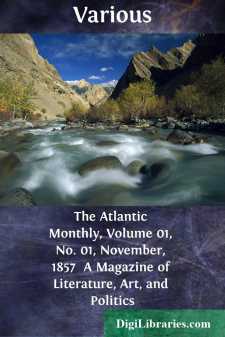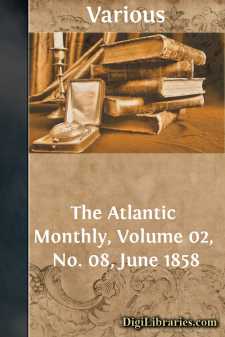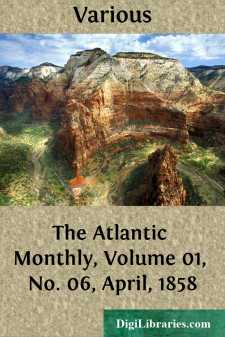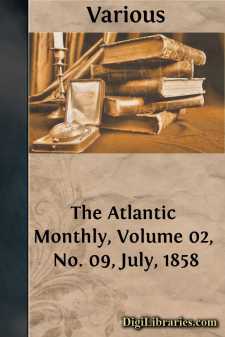Periodicals
- Art 27
- Children's periodicals 59
- Entertainment 5
- Food/Wine 2
- Games/Humor 455
- General 661
- Health 1
- History 53
- House/Home 1
- Regional 62
- Science/Nature 118
- Transportation 10
Periodicals Books
Sort by:
by:
Various
MILLERISM. Toward the close of the last century there was born in New England one William Miller, whose life, until he was past fifty, was the life of the average American of his time. He drank, we suppose, his share of New England rum, when a young man; married a comely Yankee girl, and reared a family of chubby-cheeked children; went about his business, whatever it was, on week days, and when Sunday...
more...
by:
Various
VI. THE CARMINE. The only part of this ancient church which escaped destruction by fire in 1771 was, most fortunately, the famous Brancacci chapel. Here are the frescos by Masolino da Panicale, who died in the early part of the fifteenth century,вÐâthe Preaching of Saint Peter, and the Healing of the Sick. His scholar, Masaccio, (1402-1443,) continued the series, the completion of which was...
more...
by:
Various
NOTES ON DOMESTIC ARCHITECTURE. If building many houses could teach us to build them well, surely we ought to excel in this matter. Never was there such a house-building people. In other countries the laws interfere,—or customs, traditions, and circumstances as strong as laws; either capital is wanting, or the possession of land, or there are already houses enough. If a man inherit a house, he is not...
more...
by:
Various
DOUGLAS JERROLD. My personal acquaintance with Douglas Jerrold began in the spring of 1851. I had always had a keen relish for his wit and fancy; I felt a peculiar interest in a man who, like myself, had started in life in the Navy; and one of the things poor Douglas prided himself on was his readiness to know and recognize young fellows fighting in his own profession. I shall not soon forget the...
more...
by:
Various
AMERICAN ANTIQUITY. The results of the past ten or fifteen years in historical investigation are exceedingly mortifying to any one who has been proud to call himself a student of History. We had thought, perhaps, that we knew something of the origin of human events and the gradual development from the past into the world of to-day. We had read Herodotus, and Gibbon, and Gillies, and done manful duty...
more...
by:
Various
THE GREAT FAILURE. The crucial fact, in this epoch of commercial catastrophes, is not the stoppage of Smith, Jones, and Robinson,—nor the suspension of specie payments by a greater or less number of banks,—but the paralysis of the trade of the civilized globe. We have had presented to us, within the last quarter, the remarkable, though by no means novel, spectacle of a sudden overthrow of...
more...
by:
Various
THE CATACOMBS OF ROME. ————parti elette Di Roma, che son state cimitero Alla milizia che Pietro seguette. PARADISO, c. ix. "Roma Sotterranea,"—the underground Rome of the dead,—the buried city of graves. Sacred is the dust of its narrow streets. Blessed were those who, having died for their faith, were laid to rest in its chambers. In pace is the epitaph that marks the places where...
more...
by:
Various
CHESUNCOOK. At 5 P.M., September 13th, 185-, I left Boston in the steamer for Bangor by the outside course. It was a warm and still night,—warmer, probably, on the water than on the land,—and the sea was as smooth as a small lake in summer, merely rippled. The passengers went singing on the deck, as in a parlor, till ten o'clock. We passed a vessel on her beam-ends on a rock just outside the...
more...
by:
Various
THE HUNDRED DAYS. PERSONAL REMINISCENCES. That period of history between the 20th of March and the 28th of June, 1815, being the interregnum in the reign of Louis the Eighteenth, caused by the arrival of Napoleon from Elba and his assumption of the government of France, is known as "The Hundred Days." It is as interesting as it was eventful, and has been duly chronicled wherever facts have been...
more...
by:
Various
V. Rome is preeminently the city of monuments and inscriptions, and the lapidary style is the one most familiar to her. The Republic, the Empire, the Papacy, the Heathens, and the Christians have written their record upon marble. But gravestones are proverbially dull reading, and inscriptions are often as cold as the stone upon which they are engraved. The long gallery of the Vatican, through which one...
more...











